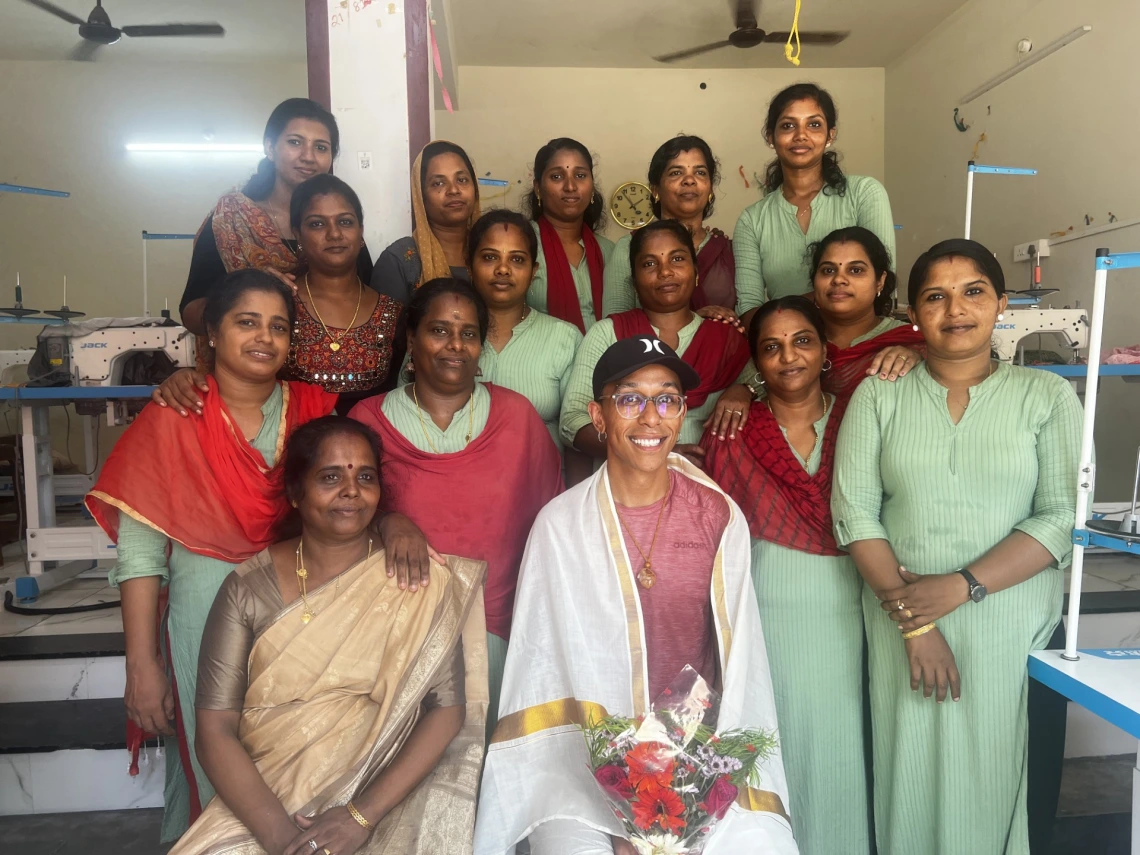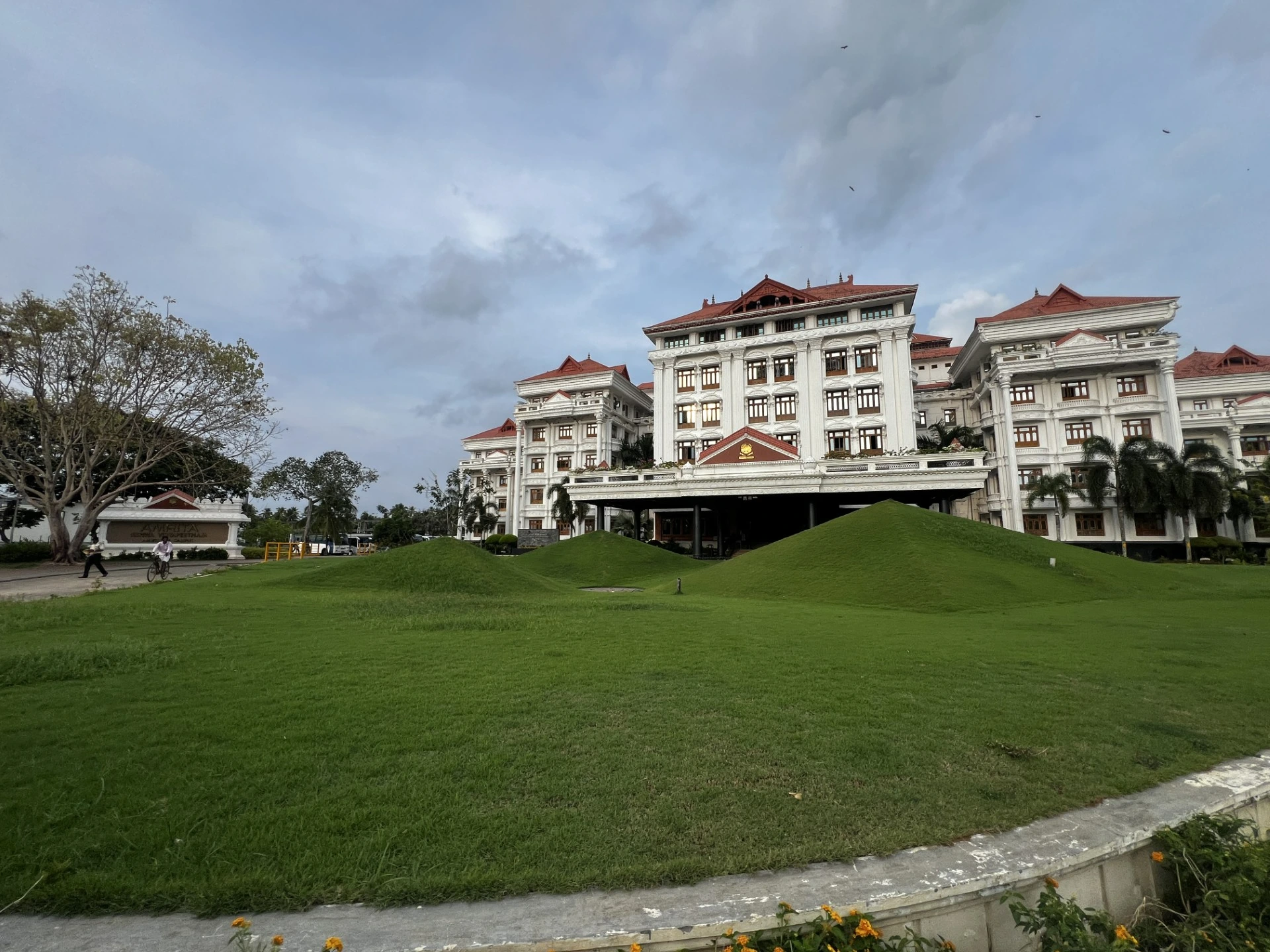Embracing Empowerment: A Journey in India

Caption from Author: My first day in the field, the women of the SHG greeted me with flowers and a shawl they had embroidered. They told me they felt confident in their abilities to start making a profit in their business because someone from "the outside" cared enough, and believed enough in them, to help them. This set the tone for my work with the SHG as a resource and supportive voice. I was challenged to utilize cultural humility and responsiveness constantly, and even though we required a translator to communicate, I felt beyond appreciated. They knew how much I valued them and their resiliency, too.
Human Rights Practice MA student Donaven Blake Smith recently participated in the Live-in-Labs program run by UA educational partner institution Amrita University in India. Donaven's experience at Amrita was supported in part by the Resilience Internships and Student Experiences (RISE) Program sponsored by the Arizona Institute for Resilience.
By Donaven Blake Smith
Human Rights Practice MA student
The transformative journey I embarked on in Kerala, India was a profound exploration of human connection, resilience, and empowerment. By immersing myself in rural India to support a women-led Self-Help Group (SHG) for six weeks, I witnessed firsthand the indomitable spirit of women striving for financial independence and social empowerment. The SHG, which came out of India’s Skill Acquisition and Knowledge Awareness for Livelihood Promotion (SANKALP) program, represents a microcosm of resistance against rigid hierarchical structures based on gender and caste. With training from the Indian government, microloans, and community financial support, the women of the SHG formed a small business where they stitch and embroider.
The women I worked alongside not only within the SHG, but within Amrita University’s Center for Women’s Empowerment and Gender Equality (CWEGE), embody values that prioritize collective welfare, interconnectedness, and resilience. My fieldwork in India underscored the importance of embracing these principles to foster sustainable and inclusive community development.

Caption from Author: This is the main Amrita University campus in Amritapuri. Absolutely beautiful. I was able to walk here within 5 minutes from my accommodation. Campus life was buzzing, with students consistently on the move. I was definitely an outsider when I was on campus, but the beauty of the space kept me grounded. Across from the university is a bridge that connects the campus to the local ashram, where Guru Amma lives, along with thousands of her followers. Living so close to spaces where I could be a full-time student and full-time practitioner of my spirituality was something I will never forget. I spent more time in the ashram meditating, reading, and experiencing the people and the food than I did on campus, but out of respect for the sacred space, I cannot share photos of the ashram.
During my first visit with SHG on April 22, 2024, the women greeted me with a shawl they embroidered with flowers and an elephant, along with a handmade bouquet. With translation support from a local PhD student who already had a relationship with the SHG, I learned about the daily lives of the women and the challenges they face. Despite financial pressures, conflicts with their husbands about their lack of sustainable income generation, and personal health and family struggles, the women’s unwavering motivation and support for each other were palpable.
Offering emotional and practical support
The SHG provides a sanctuary for these women, offering emotional and practical support; they find solace and strength in one another. Their collective resilience and commitment to their business underscore the power of community and mutual aid in overcoming adversity. Their shared experiences and collective aspirations foster a supportive environment where empowerment is not merely an individual achievement but a communal goal. This sense of interconnectedness and mutual support is essential in creating sustainable change and fostering resilience.
Financial independence is a primary motivation for the women of the SHG. They aspire to contribute to their families without relying solely on their husbands, who often control financial decisions. This desire for autonomy and self-sufficiency is the driving force behind their perseverance and ingenuity. Despite the financial challenges of repaying their loans and generating little income, the women of the SHG demonstrated remarkable determination during my time with them, securing promising orders and exploring innovative business ideas. The strengths of these women include their stitching skills, supportive community structure, and a strong commitment to their business and each other. They are masters at in-person marketing and juggling multiple responsibilities from their kids to their personal health and well-being.
My critical intervention for the SHG was the delivery of a workshop on social media management and marketing. This workshop aimed to bridge the gap between knowledge and practice, empowering the women to leverage social media platforms for business growth. The enthusiasm and engagement during the workshop were promising indicators of their commitment to applying these new skills. They now have profiles on Instagram and Facebook where they can further engage their customers. The workshop highlighted the importance of ongoing support and interventions to ensure long-term sustainability and success for SHGs in rural India. The workshop development and delivery experiences reinforced the value of integrating holistic and community-oriented approaches into development and human rights practice.
Facing the challenge to be present and culturally responsive
Even though I am highly adaptable and flexible – thanks to my upbringing as a military child – adjusting to India and rolling with the punches was not an easy experience. I was challenged to be more present and culturally responsive, to sit with discomfort, and to dive deep into my spirituality. This journey was not only a professional endeavor but also a deeply personal transformation. The challenges I faced, from health issues to the emotional weight of global conflicts, tested my resilience and commitment.
I broke my toe, had an ear infection that sidelined me for a week, and experienced food poisoning twice. Meanwhile, the genocide in Gaza and other humanitarian crises weighed heavily on my heart and mind. Campus protests erupted back home, and I desperately wanted to be on the frontlines, supporting students and standing in solidarity with Palestine. This ongoing turmoil deeply affected my mental health, causing nightmares, insomnia, and depression. I felt guilty for these feelings while having the privilege of being in India.
Ironically, while being pulled out of the present by these events, I studied presence, mindfulness, and the nature of Being at the local ashram and through spiritual books like The Power of Now and the Bhagavad Gita. I experienced mantra diksha, where Amma, the “Hugging Saint” and spiritual Guru of the ashram, imprinted a mantra onto my soul by whispering it into my ear. She shared some of her divine wisdom and energy with me, catalyzing my spiritual growth and providing me with sacred words that I’ll carry with me for the rest of my time on this Earth.
Experiencing a radical shift
These experiences radically shifted something inside me, a change I would have struggled to achieve amidst the constant activation of the nervous system typical in the West. Distance from civil unrest, predatory capitalism, and the daily grind allowed me to practice being present and checking the ego while confronting humanity's horrors in an environment where acceptance was necessary.
I will often be on the frontlines of extreme human suffering. Learning to disidentify from pain and recognizing that it isn't who I am helps in understanding that deep, collective suffering caused by the ego, and reinforced by oppressive systems, is what fuels violence. What I am at my core is love, light, and pure consciousness. That is what we all are, and it was supportive that the people I was surrounded by in Kerala shared this philosophy. My time in India was liberating. It taught me how to let go of a lifelong pain narrative that I had placed my identity in. Although taming the mind is a lifelong practice, it is only from a place of conscious Being and presence that I can truly love others, show up in the world and in my work with compassion and joy, and experience healthy relationships.
As I reflect on the profound impact all of this had on me, I am reminded of the words of Amma, the Guru of the ashram: "Like the two wings of a bird, women and men are of equal value. For without the two in perfect balance, humanity cannot progress.”
The women of the SHG exemplify this balance, embodying the strength, resilience, and wisdom necessary for collective liberation. It was an honor to stand in solidarity with them, and I am committed to carrying these lessons forward in my work as a human rights practitioner.
My experience in India, marked by both personal and professional growth, was a transformative journey of empowerment, resilience, and hope. The women of the SHG showed me what incredible strength and commitment look like, and their journey offers invaluable lessons in embracing holistic and community-oriented approaches to development.

